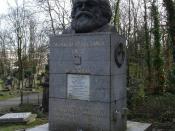In this essay I will attempt to illustrate how the capital-intensive nature of the economy, the high levels of market concentration and the high level of unemployment in South Africa are both related yet at the same time have many other independent variables accounting for them. I will compare this with the Marxian concept of economics, and will start by examining exactly what Marx's beliefs were and, therefore, how they lead to his predictions for the state.
Marx was essentially a classical economist and has been described by Lassalle (McLellan 1975: 51) as "a [David] Ricardo turned socialist." He saw the capitalist system neither as virtuous nor as a given, wishing to analyse "the birth, life, and death of a given social organism and its replacement by another, superior order (McLellan 1975: 51)." Also strongly in contrast to modern economic schools of thought, Marx regarded the concept of value apart from price.
Rather, Marx adhered to the labour theory of value, central to classical theory.
For Marx the value of a product could be indirectly calculated via the amount of labour embodied in it, with lesser regard on supply and demand. Commodities are essentially, in this regard, congealed labour. The price is seen to shift around the amount of labour used in a product. This gives an alternative explanation for the "diamond-water paradox", as much more labour is required to attain a cut diamond than to tap water.
Marx distinguishes between use-value and exchange-value. In earlier ages, use-value could be applied to the exchange of goods directly or with the intermediate use of money. In contemporary times, however, Marx hypothesised that the ultimate aim of capitalism is to turn products into profit. Capitalists supposedly do this through exchange-value, which is achieved through the exchange of capital and labour, where the...


